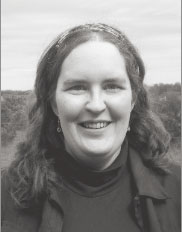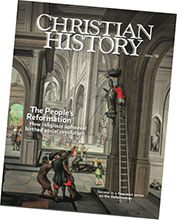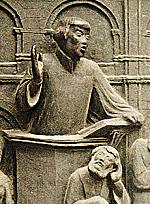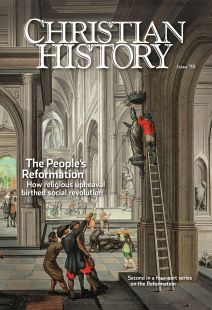Editor's note: Urban Reformation
MY HUSBAND, EDWIN, whose name you’ll see a few times in this issue, studied Protestant reformer Martin Bucer in graduate school, so the Reformation tends to surface in unexpected ways in our house.

But I have a new appreciation for those stories in the context of this issue. When we take a step back from those isolated tales, they become part of a larger picture of a society plunged into a great deal of upheaval. Ideas birthed by Luther—and independently of him in other places, including Zwingli’s Zurich—did not remain in the rarefied realms of theological debate. They found their way into the hands and minds of the common people in ways that would transform the entire social and cultural landscape.
New roles and new problems
Peasants took new ideas of freedom into the political realm and demanded rights from their overlords. Priests and nuns married (usually each other, because no respectable merchants or bankers wanted their daughters to marry priests). Churches looked profoundly different when you entered, because the art that had formerly covered their walls had been forcibly, sometimes violently, removed. Worship services sounded different, and people were asked to behave differently in them (listen to the pastor—save the rosary for your private devotions!). New roles in church (pastor’s wife) opened up to Protestant women, while others (nun, abbess, virgin) closed down.
Rulers chose one side or the other and expected their people to comply. Afraid of political and social instability, they attacked others who believed differently. Both Protestants and Catholics punished—frequently by death—those on the other sides of debates, and almost everybody tracked down and drowned Anabaptists, who were considered so radical they were deemed dangerous by all. (Yes, death was seen as an appropriate penalty for heresy. You’ll find out why on pp. 33–36.)
Order Christian History #118: The People’s Reformation in print.
Subscribe now to get future print issues in your mailbox (donation requested but not required).
Scholars call much of this the “Urban Reformation” because it happened in and around great sixteenth-century cities, especially three we focus on here: Basel, Zurich, and Strasbourg. From these centers of learning and commerce, ideas took flight, books rolled off presses, and reformers traveled and preached and taught. Networks of family and social connections built up. Western Europe plunged into turbulence, and 500 years later we are still living with the results.
This is the second issue in our series of four on the Reformation (the first was issue 115 on Luther). We have chosen to call this issue the “People’s Reformation.” When people get hold of ideas, things happen—sometimes things that no one ever could have expected. CH
This article is from Christian History magazine #118 The People’s Reformation. Read it in context here!
Christian History’s 2015–2017 four-part Reformation series is available as a four-pack. This set includes issue #115 Luther Leads the Way; issue #118 The People’s Reformation; issue #120 Calvin, Councils, and Confessions; and issue#122 The Catholic Reformation. Get your set today. These also make good gifts.
By Jennifer Woodruff Tait
[Christian History originally published this article in Christian History Issue #118 in 2016]
Jennifer Woodruff Tait is managing editor, Christian HistoryNext articles
When the state advanced the church
Reformation ideas flourished—and caused conflict—in bustling cities
Jim West and Edwin Woodruff TaitAllies or Enemies?
The Reformers soon divided over crucial issues; Luther himself was one reason why
Robert D. LinderNot only what was believed but what was done
Reformers wanted to change behavior, not just doctrine
Jon BalserakSupport us
Christian History Institute (CHI) is a non-profit Pennsylvania corporation founded in 1982. Your donations support the continuation of this ministry
Donate






